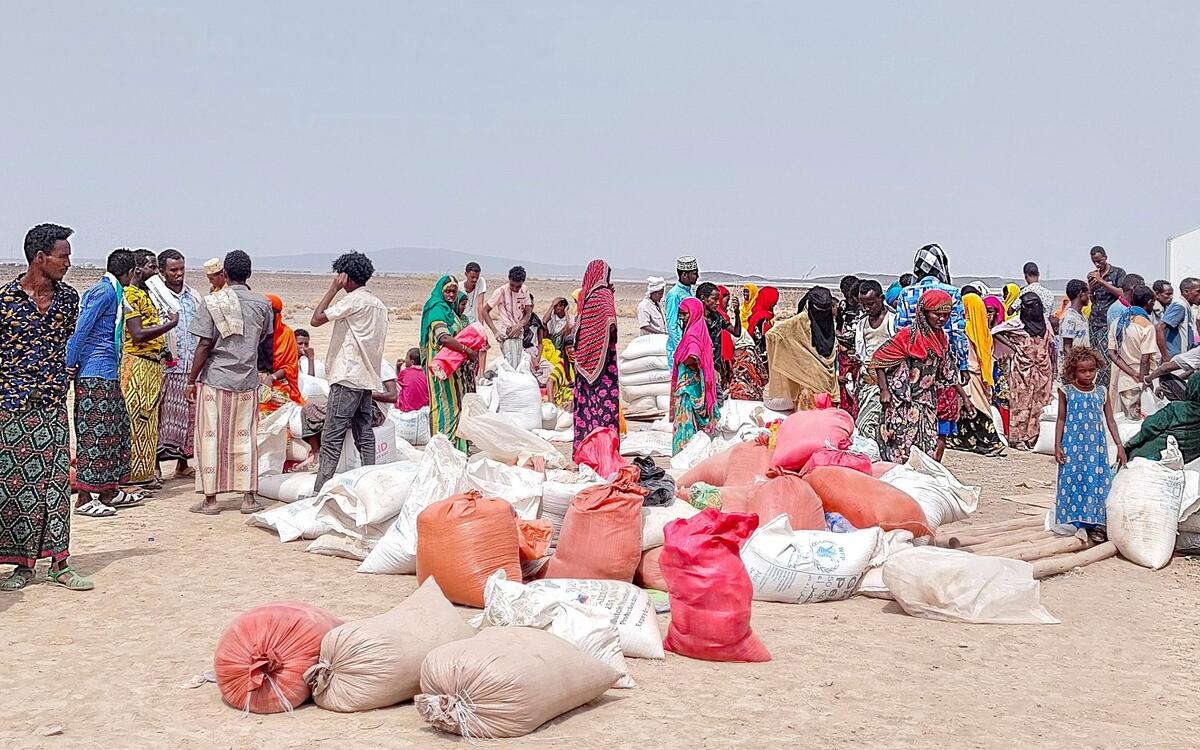UNHCR, AfDB, IGAD and EAC launch project to enhance investment climate in refugee and IDP-hosting and return areas in the East, Horn of Africa and Great Lakes region
UNHCR, AfDB, IGAD and EAC launch project to enhance investment climate in refugee and IDP-hosting and return areas in the East, Horn of Africa and Great Lakes region

Today, UNHCR, the UN Refugee Agency, together with the African Development Bank (AfDB), the Intergovernmental Authority on Development (IGAD), and the East African Community (EAC), have launched a ground-breaking regional project that seeks to establish a mechanism for enhancing the investment climate in displacement affected areas in the region.
Funded by AfDB for an amount of US$ two million through the Transition Support Facility, the project, dubbed “Regional Program on Enhancing the Investment Climate for the Economic Empowerment of Refugee, Returnee and Host/Return Community Women in the East and Horn of Africa and Great Lakes Region” will address barriers that hinder the economic empowerment of refugees, returnees and their host communities. The project will also identify sectors of competitive advantage for investment and trade in selected refugee and IDP-hosting and return areas.
Key stakeholders from national investment agencies as well as representatives from refugees, returnees and host communities, also participated in the launch.
“UNHCR welcomes this great opportunity to partner with the private sector in boosting the socio-economic conditions in refugee-hosting and return areas, often with limited opportunities, for people forced to flee to thrive economically,” said Clementine Nkweta-Salami, UNHCR’s Regional Bureau Director for the East, Horn of Africa and the Great Lakes. “Enhancing the growth of the private sector in displacement affected areas not only generates more revenues and investment, but also gives refugees, returnees and their hosts opportunities to earn meaningfully and contribute to the development of their societies,” said Nkweta-Salami.
The project will target seven refugee and return-hosting areas in eleven countries in the region, namely Burundi, Djibouti, Eritrea, Ethiopia, Kenya, Rwanda, Somalia, South Sudan, Sudan, Tanzania, and Uganda.
From July to September 2022, consultations will be held with key stakeholders to identify specific sectors that require new and additional private sector investment. A study that will look into specific hindrances to trade, entrepreneurship, and employment, as well as analyze the economic potential of target locations, will also be conducted.
“AfDB welcomes this initiative as it is part of our commitment to leave no one behind. We are keen to improve the quality of life for the people of Africa in fragile situations, including refugees, returnees and host communities, while paying particular attention to gender," said Nnenna Nwabufo, AfDB’s Director General for East Africa. "Supporting investment climate reforms is not only a catalyst for private sector participation in refugee hosting and return areas, but also builds resilience and increases economic empowerment of refugees, returnees and host communities,” she further said.
Regional bodies IGAD and EAC, participating member states, as well as local displaced and host populations, will work together to strengthen a framework for cooperation on how to improve the investment climate in target areas, and improve national and regional capacities on investment climate reform, including financial inclusion of displaced populations.
“This new joint program is in line with IGAD’s mandate and migration program interventions to put in place an enabling environment for refugees, returnees and their communities to become self-reliant,” said Ms. Fathia Alwan, IGAD’s Director for Health and Social Division. “Unlocking their economic potential further creates a catalytic effect that could benefit countries especially given limited options for durable options for refugees in the region including resettlement, as well as dwindling humanitarian resources in IGAD member states to support refugees and returnees,” said Alwan.
“Since its rebirth in the late 1990s, the East African Community (EAC) has identified sound refugee management as critical to sustainable economic development and political integration in host countries and communities,” said Mr. Aime Uwase, EAC’s Acting Director, Planning. “Consequently, the need for the development of common mechanisms for the management of refugees was included in Article 124 of the Treaty for the Establishment of the East African Community (2000),” said Uwase.
“This project will therefore be instrumental in ensuring the private sector potential in refugee hosting and return areas is enhanced, and ultimately enable the EAC with support from AfDB, UNHCR and IGAD to attain the objectives of economic development. EAC is fully committed to the realization of the objectives of this project,” he added.
As of June 2022, over 5 million refugees and asylum-seekers are hosted in the region, with another 12.6 million people internally displaced by conflict and climate induced natural disasters.
UNHCR continues to support host governments and communities to provide protection and assistance to the forcibly displaced, as well as find durable solutions in line with the Global Compact on Refugees.
END
For more information, please contact:
Faith Kasina, UNHCR/Nairobi, Mob: +254 113 427 094, [email protected]
Joyce Mulama, AfDB/Nairobi, Mob: +254 724 975 170, [email protected]







